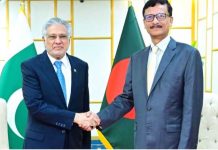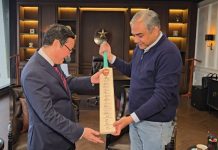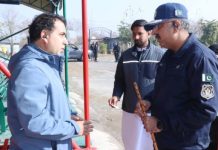LAHORE, SEPT 11 (DNA) – The Centre for Aerospace & Security Studies (CASS), Lahore, hosted a seminar titled “Adapting to Strategic Complexities: Innovating Approaches to Arms Control in South Asia” on 10 September 2024. The seminar explored the intricate dynamics of strategic stability and arms control in the South Asian region, focusing on the impact of Indian belligerence and recent technological developments. Ms Nidaa Shahid, Senior Researcher, CASS Lahore, commenced the seminar with an overview of the event’s objectives.
Lt Gen Khalid Kidwai (Retd), Adviser, National Command Authority (NCA), delivered the keynote address. He highlighted that Pakistan’s Full Spectrum Deterrence (FSD) capability, while generally remaining within the larger philosophy of Credible Minimum Deterrence, enables Pakistan to effectively counter aggression through smart deterrence strategies. While discussing arms control and disarmament, he emphasised the difference between the two. He said that while arms control arguably may be an option without disturbing strategic balance, disarmament for Pakistan is a no-go area. He concluded by stating that Pakistan’s policy of FSD ensures that strategic stability in South Asia will continue to prevail irrespective of global and regional shifts. India must recognise that political bluster and political rhetoric is not policy and must be dispensed with.
Dr Naeem Salik, Executive Director, Strategic Vision Institute (SVI), provided insights into the complexities introduced by advancements in missile technologies. Examining the impact of these newer technologies, such as Multiple Independently Targetable Reentry Vehicles (MIRVs) and hypersonic cruise missiles, he discussed how they intensify strategic competition and challenge existing arms control frameworks in South Asia.
Ambassador Zamir Akram (Retd), Adviser, Strategic Plans Division (SPD), highlighted that arms control measures can only work when both sides are willing to work together and make concessions. He said that some of the measures that have been on the plate for decades have now become redundant, owing to Indian developments, including the Ballistic Missile Defence (BMD) and Anti-Satellite Weapons (ASAT) test of 2019. He added that even the Indian No First Use (NFU) pledge is conditional to the situation as noted by many Indian leaders.
In his concluding remarks, Air Marshal Asim Suleiman (Retd), President CASS, Lahore, noted the need for a shared modernised strategy, tailored to address evolving regional strategic stability challenges. He said that the path forward necessitates a steadfast commitment to dialogue, trust-building, and practical risk-reduction measures to secure a more stable and peaceful future for South Asia. He further said that given the recent actions of the Indian leadership, the responsibility for creating a conducive environment for arms control rests squarely on their shoulders.
The seminar probed the imperatives for arms control in South Asia amid strategic complexities, highlighting the critical need for innovative and collaborative approaches to maintain regional security.

















